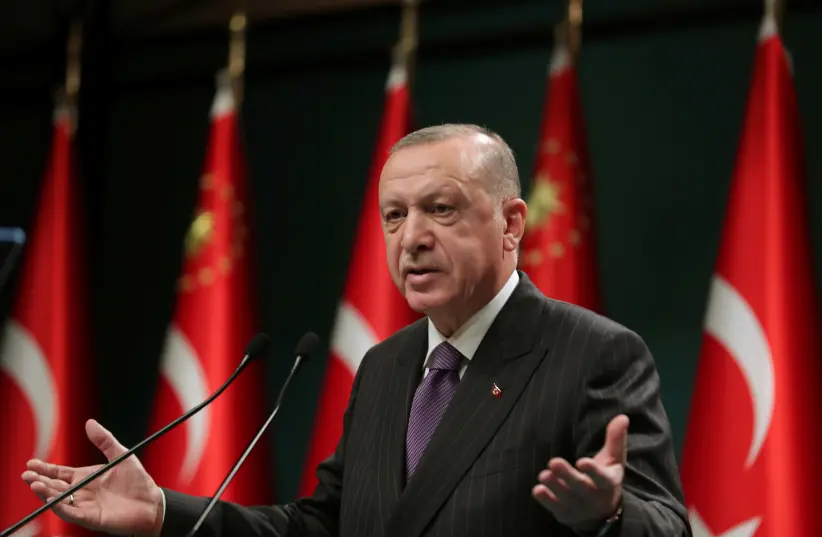Previous US presidents have avoided using the term ‘genocide’ out of fear of angering key NATO ally
US President Joe Biden’s expected recognition of the Ottoman Empire’s mass killings of Armenians as genocide is a sign of Turkey’s waning influence over Washington, analysts told The Media Line.
Biden is expected to make the recognition on Saturday, Armenian Genocide Remembrance Day, according to US reports, which cited unnamed officials.
Turkey’s foreign minister told a local news channel that such a move would harm relations with the United States.
That sentiment was echoed by Turkey’s main opposition party, The Republican People’s Party, in a statement released on Thursday, denouncing the possible move by Biden.
“This is unjust, unwarranted and inappropriate. We do not accept this characterization,” the party said in its statement.
Turkey, where many revere the Ottoman Empire, accepts that Armenians were killed but has long refuted equating the deaths with genocide.
“Genocide recognition is going to be a large blow to the Turkish government,” said Berk Esen, an assistant professor of political science at Sabancı University in Istanbul.
He says Biden has been angered by Turkish President Recep Tayyip Erdogan’s policies that went against US interests and believes the Turkish president can’t respond too strongly while he is dealing with a major spike in COVID-19 cases and an economic crisis in his country.
Relations with the US are especially important to Turkey’s economy, which strongly relies on foreign investment.
A 2018 diplomatic dispute between the two countries over Turkey’s detention of US pastor Andrew Brunson led to Washington placing sanctions on Ankara which sent Turkey’s currency into free fall.
Economists said the image of Ankara arguing with the biggest economy in the world played more of a role in the economic crisis than the sanctions themselves.
Esen told The Media Line that the recognition of genocide would show how low US-Turkish relations have sunk, considering previous presidents avoided using the term so that they would not upset an important NATO ally.
Turkey has made a slew of decisions since the dispute that have harmed ties with Washington, including launching an offensive against US-allied Kurdish forces in Syria and purchasing an advanced Russian anti-missile defense system, the S-400s, which led to Ankara being kicked out of the US F-35 joint strike fighter program.
“I think the deterioration in US-Turkish relations really is the big difference maker here,” said Alan Makovsky, a senior fellow for national security and international policy at the Center for American Progress in Washington, who previously worked on Turkish affairs at the US State Department.
Turkey’s geopolitical position, bordering Iraq, Iran and Syria, has made it a valuable NATO ally, including by hosting a base which was used by the US to launch attacks against the Islamic State in Iraq and Syria.
Makovsky told The Media Line that a Biden recognition of the Armenian deaths as genocide would be a signal to Turkey that it doesn’t have the amount of leverage it believed it did.
“It’s a problematic relationship. The US is starting to hedge its bets a bit … people still see [Turkey] as important strategically but I think Turkey has lost its veto power in certain areas in the US, including on this issue,’ he said.
Makovsky added that the lack of a strong reaction from Ankara after the US Congress passed a resolution to recognize the deaths as genocide showed there probably would be no major fallout from such a move.
Even before he became president, Biden said he would take a tough line with Erdogan, telling The New York Times he would support the opposition.
Since taking office, Biden has not held a phone call with Erdogan even as the Turkish president attempts to strengthen relations with his Western allies.
Aykan Erdemir, a former member of the Turkish parliament with the main opposition party, told The Media Line that Turkey would likely act the same as it did to other countries which have recognized the genocide, such as by recalling the US ambassador.
Erdemir, senior director of the Turkey program for the Washington-based Foundation for Defense of Democracies, said such a clash with the US would be short-lived but welcomed by Erdogan who could use the row to distract the public from the country’s domestic issues while playing to his nationalist base.
He said the recognition of genocide by both the Senate and House of Representatives in 2019 showed how bipartisan skepticism of Erdogan has become in the US.
“Ultimately, the Erdogan government’s policies have isolated Turkey in Washington,” he said. “Turkey ended up with no friends to advocate for Ankara’s position in Washington.”
 Eurasia Press & News
Eurasia Press & News



